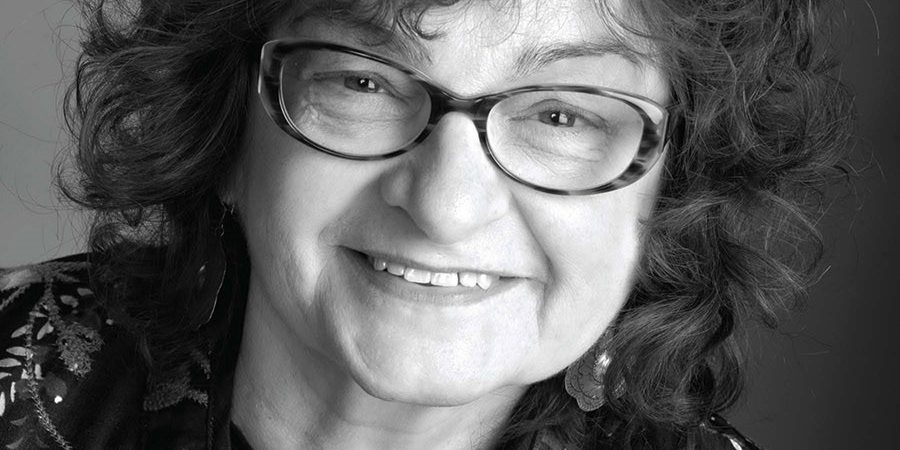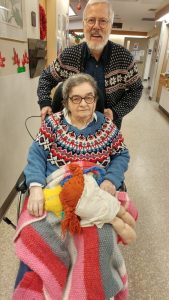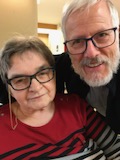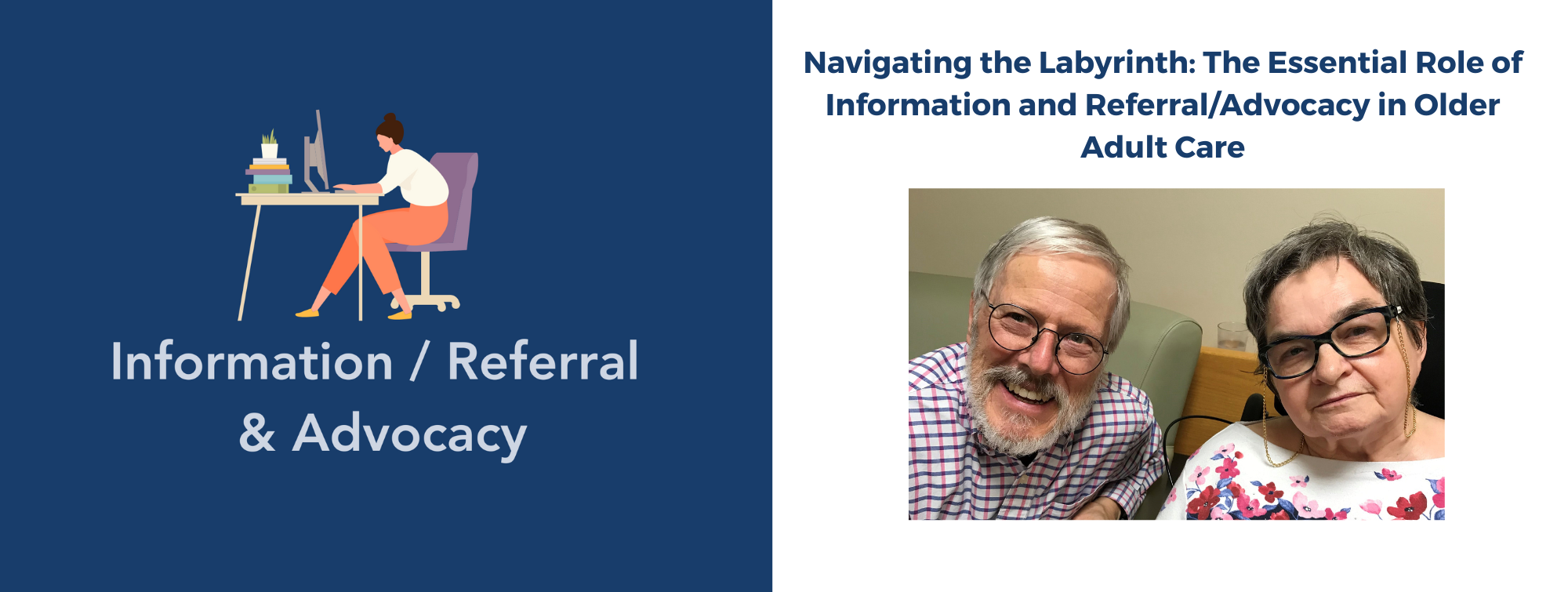Navigating the Labyrinth: The Essential Role of Information and Referral/Advocacy in Older Adult Care

(Photo above: Photo of Anne Lambert was taken in 2011 for her induction into the University of Alberta, Museums and Collections, Hall of Fame. Anne and 3 others were the initial recipients of the Curator Hall of Fame Award. In 2017, her collection in Human Ecology was officially named as the Anne Lambert Clothing and Textiles Collection.)
David Howatt, once a public administrator with the Edmonton Police Service (for 26 years) and then the University of Alberta for another dozen years, had his life's trajectory shift in an unexpected direction when his wife started to develop signs of dementia following a severe car accident. The journey that followed transitioned him into a caregiver role and, eventually, a staunch advocate for caregivers, navigating the intricate maze of the health and long-term care system.

David Howatt, and wife, Anne Lambert, in 2019.
The accident precipitated a slow transition, where David, almost imperceptibly, found himself stepping into the role of a caregiver. As his wife struggled with her diagnosis of early onset dementia and changing abilities, David kept his job, supporting his family while learning to navigate the complex landscape of dementia care. He recalls the period as one of adaptation and learning, remarking on the value of early training, "I recommend that almost anyone of a certain age takes at least an introductory training session [with the local chapter of Alzheimer Society of Canada]." Through the support and respite provided by CHOICE Day Programs, David’s wife was able to remain at home before her transition to long-term care.
Despite the challenges, David's devotion to his wife never wavered. His love shines through in his regular visits to the long-term care facility where his wife now resides. He speaks warmly of the community there, with its pub nights and social opportunities, providing a sense of comfort and security. Yet, he acknowledges the difficulties in understanding the vast network of medical professionals and navigating the healthcare system, expressing a desire for better navigational and referral assistance.
David's journey underscores the wide-ranging value of resources like those provided by community-based senior serving (CBSS) organizations, such as the Alzheimer Society, provide access to information, referrals, assessment, and case management support through an outreach program soon to be coordinated by the Edmonton Seniors Coordinating Council (ESCC). The outreach and support workers seek to play a crucial role in providing navigation assistance to older adults and caregivers, helping them traverse the complex challenges. A coordinated outreach program will reach more older adults and caregivers, helping to ensure they receive the resources they need. As the population of older adults grows, so too will the need for more outreach workers grow. Supports like coordinated outreach can help seniors and caregivers feel less alone in the challenges they face and link them to professionals with strong knowledge of resources available in the community.

David and Anne head out for a pre-lunch one-person concert.
Despite his efforts to learn as much as possible to support his wife, David emphasizes the need for more help:
"I still could use a navigator or someone knowledgeable about the (health and long-term care) system."
His words highlight the pressing need for more support, resources, initiatives, and knowledgeable guides that can bridge the health and community support services for older adults serving sector. Initiatives like The Edmonton Social Prescribing Collaborative Project, supported by ESCC, offers a means for a holistic approach to healthcare that bridges this gap between medical and social care services. Through this approach, healthcare professionals can refer their patients to community-based programs to improve their health and enhance their quality of life. Project Link Workers are situated withing CBSS organizations to work directly with clients as navigators for services and to assist clients with identifying and achieving their goals utilizing services offered by CBSS organizations.
Many older adults take on significant and often overlooked roles as caregivers within their families, providing essential support for their family members, chosen family, friends and neighbours. In 2018, 1.5 million of the 7.8 million Canadian caregivers were aged 65 years and older. This means that almost one-quarter of Canadians aged 65 years and older (24%) were caregivers in 2018, which is similar to the proportion of caregivers amongst all Canadians aged 15 years and older (25%). Alberta's 1 million family caregivers contribute an astounding $11 billion worth of unpaid care annually. That is equivalent to 32% of the entire 2021 Alberta Health Budget. ($11-12 Billion is for all caregivers, NOT only to older people.)
https://www150.statcan.gc.ca/n1/daily-quotidien/201124/dq201124a-eng.htm
Educating health and social care providers on the needs and challenges faced by family caregivers is crucial for fostering effective support systems. By equipping providers with the knowledge and skills to understand and address the unique requirements of caregivers, we can enhance the quality of care and overall well-being of both the caregiver and care recipient. Fortunately, the University of Alberta Department of Family Medicine, with broad input from numerous professionals, experienced caregivers and educational experts, has developed Caregiver-Centered Care Education to equip providers with the competencies to recognize, communicate and engage family caregivers as partners in health and social care. It is available Free online (www.caregivercare.ca) and providers receive a Continuing Competency Certificate on completion.
In addition to education, David shared,
“there needs to be more involvement - ways for caregivers to know each other, get to know each other, and share things,”
and identified that often there are barriers due to privacy issues that prevent these opportunities from occurring. CBSS organizations can help connect caregivers with peer support and caregiver coaching to help them feel connected and empowered.

Photo taken in 2019.
David's story is a compelling argument for why we must prioritize and invest in information, referral, and advocacy services for caregivers and older adults. These services are not only crucial for enhancing the quality of care but also for improving the lives of caregivers. They represent an investment in our collective future, fostering a society marked by empathy, understanding, and inclusivity. Without sustained investment and funding for operations, the CBSS sector simply would not be able to provide these essential services that support older adults and their caregivers.
David’s story reflects the reality of countless other caregivers who find themselves thrust into roles they never anticipated, often without the necessary tools or knowledge to navigate these challenges. This underscores the necessity for robust advocacy efforts to help raise awareness, garner support, and drive change at systemic and policy levels to better support aging populations and their caregivers.




